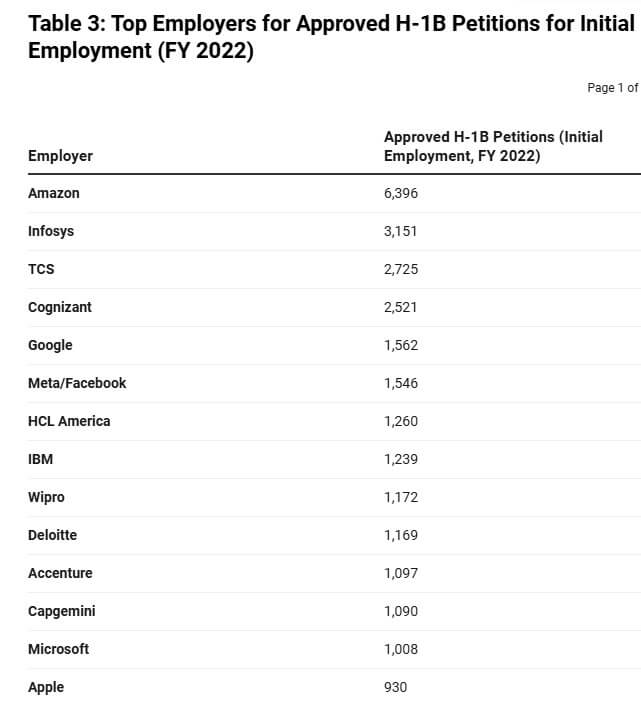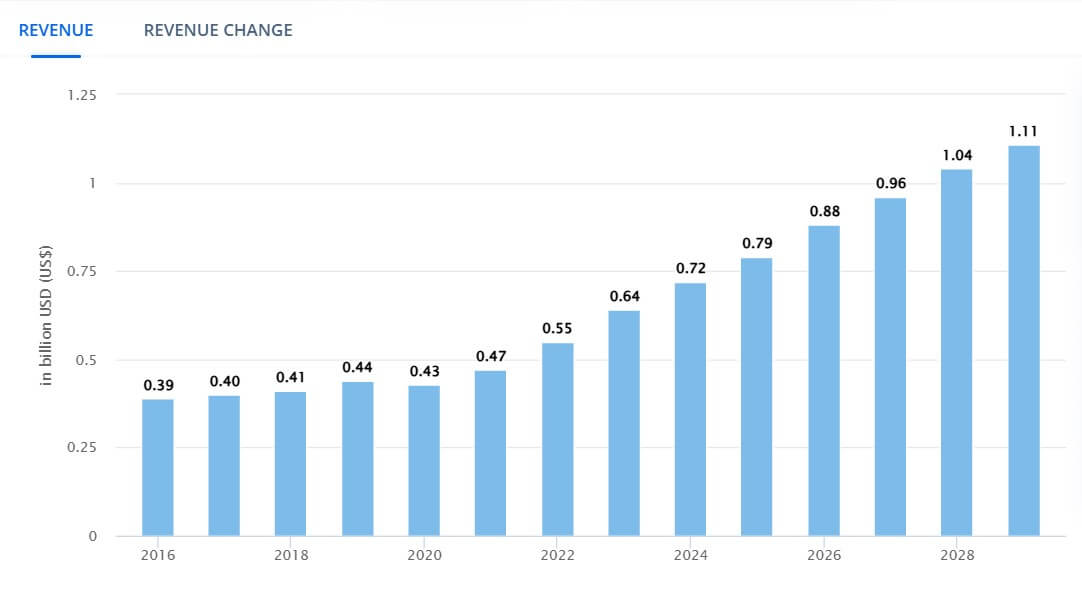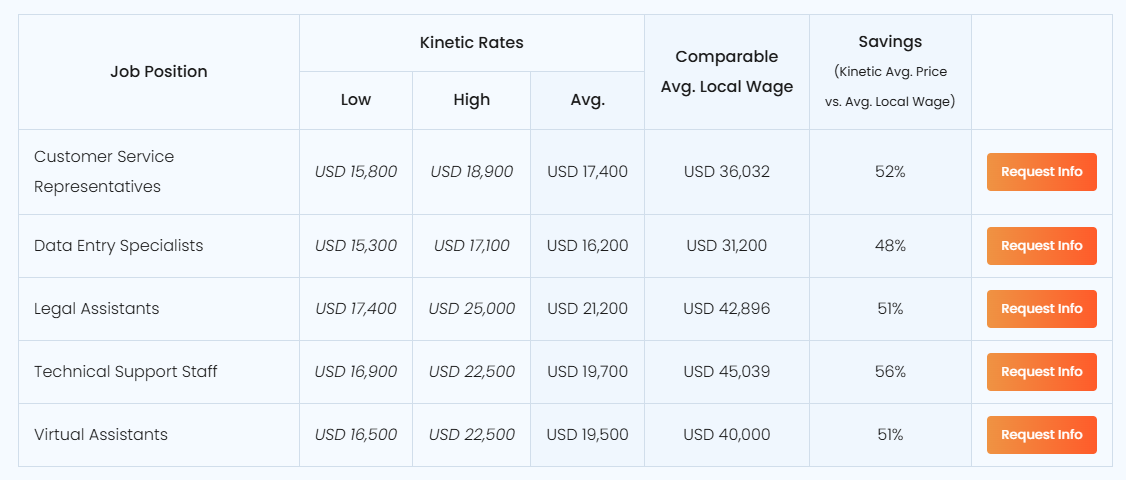Stuck in the H-1B visa maze? Your business deserves better.
The endless waiting, paperwork, and uncertainty are not just frustrating—they’re costing you opportunities, time, and money. But what if there’s a way to sidestep this roadblock entirely?
Offshore staffing offers a smarter solution that bypasses delays, slashes costs, and builds your dream team faster than ever.
By tapping into skilled professionals in talent-rich countries like the Philippines, businesses can secure top-tier talent without the headaches of visa quotas or long waiting times.
This article will explore how outsourcing is the ultimate solution to the H-1B challenge.
I. The H-1B Visa Problem: Why U.S. Companies are Struggling

The H-1B visa process was designed to provide U.S. companies with access to specialized talent from around the globe. However, over the years, this once-reliable solution has become a bottleneck for businesses in need of skilled professionals.
H-1B Quotas: A Numbers Game
Each fiscal year, the U.S. Citizenship and Immigration Services (USCIS) issues a strict cap of 65,000 visas, with an additional 20,000 set aside for those holding advanced degrees from U.S. institutions. While these numbers might have been sufficient decades ago, they pale in comparison to today’s demand.
In 2024 alone, over 780,000 registrations were submitted—more than 12 times the available slots. This staggering imbalance means that nearly 80% of applicants will face rejection, not due to a lack of qualifications but because of sheer volume. As one frustrated HR manager put it, “It’s like playing the lottery with your company’s future.”
The odds are especially daunting for small and mid-sized companies that must compete against tech giants like Amazon, Google, and Meta, which routinely secure a significant portion of the visas. Even geographically, states like California and Texas dominate approvals, leaving smaller businesses across the Midwest and Southeast scrambling for talent. For companies already battling tight labor markets, the system feels stacked against them.

The Financial Cost of Delays
The financial burden of the H-1B process is another significant hurdle. It is a labyrinth of fees, legal costs, and administrative efforts. The base filing fee for an H-1B petition ranges from $460 to $2,805, but this barely scratches the surface. Add in premium processing fees, legal counsel, and compliance expenses, and the cost per application can easily exceed $10,000.
For businesses, the stakes are high. Take the example of a mid-sized biotech company awaiting approval for a highly specialized lab technician. “We were ready to launch a groundbreaking research project, but a six-month delay forced us to put everything on hold,” the CEO shared. “That single delay cost us over $50,000 in lost funding opportunities.”
Delays also ripple through other operational areas. Missed product launches, stalled R&D efforts, and extended timelines for IT rollouts all translate to lower productivity and lost revenue.
Ripple Effects on Productivity
The talent shortages caused by H-1B limitations hit companies where it hurts most: their ability to function efficiently. Imagine a healthcare organization unable to hire enough foreign-trained nurses during a nationwide staffing shortage, or a startup forced to scale back its innovative projects due to a lack of software engineers.
These gaps lead to stretched teams, overworked employees, and subpar outcomes. “We had to shelve a major client project because we simply didn’t have the people to deliver it,” a startup founder lamented. “Our existing team worked overtime, but we couldn’t sustain the quality our clients expect.”
The issue is widespread. In a 2021 Gartner Survey, 64% of IT executives believe that the shortage of talent is one of their most important challenges. With each unfilled position, companies lose not just money but also momentum.
Even temporary solutions, such as hiring less-qualified staff, come with their own set of problems, often compromising quality and further straining already-stressed teams. For industries like technology, where the race to innovate is relentless, these productivity losses can mean falling behind competitors.
The current system, riddled with delays, restrictions, and inequities, leaves U.S. businesses grappling with mounting costs and dwindling talent pools. If companies are to thrive in an increasingly competitive global market, a more effective solution is urgently needed.
II. The Offshore Staffing Solution: A Cost-Effective Way to Overcome Visa Challenges
U.S. businesses are turning to offshore staffing as a practical and efficient alternative to hiring skilled professionals from countries like the Philippines—where the talent pool is abundant and cost-effective.
Offshore staffing is the practice of hiring professionals from overseas locations to perform tasks remotely. The Philippines has become a global hub for this model, thanks to its highly skilled workforce, strong English proficiency, and competitive labor costs.
Proof of the migration to outsourcing is the increasing BPO (Business Process Outsourcing) revenues for powerhouse countries like the Philippines.
According to Statista, the Philippine outsourcing market is projected to have revenues of $790 billion in 2025 and will continue to grow as more U.S. businesses take advantage of its offerings. (Seventy percent of business comes from North America.)

Benefits of Offshore Staffing Over H-1B
- No Visa Hassles:
Offshore staffing eliminates the need for navigating the complex and time-consuming H-1B visa process. Instead of waiting months—or even years—to onboard skilled professionals, businesses can hire offshore workers almost immediately. - Cost Savings:
Hiring offshore talent, particularly in the Philippines, can significantly reduce expenses. Professionals in the region often cost 70% less than their U.S. counterparts.

- Flexible Hiring:
Offshore staffing allows companies to scale their workforce up or down based on project needs. Whether it’s a short-term project requiring niche skills or a long-term engagement for core operations, offshore staffing offers unmatched flexibility. - 24/7 Operations:
By leveraging time zone differences, businesses can operate around the clock. For example, a U.S. company with an offshore team can ensure tasks are completed overnight, improving turnaround times and enhancing customer service availability. - Access to Top Talent:
The globe is home to highly educated workforces with expertise in various industries, including technology, healthcare, finance, and customer service. There are a number of English-speaking nations as well, making communication seamless for international business collaborations.
Offshore staffing offers a compelling alternative to the challenges of the H-1B visa process. By sidestepping visa delays, reducing costs, and accessing a global talent pool, companies can maintain productivity and competitiveness in an increasingly complex hiring landscape.
In the next sections, we will look more closely at the virtues of outsourcing and how it is the smarter way to build world-class teams.
III. How Offshore Outsourcing Works

Digital technology has transformed the way businesses operate, making it entirely possible to hire and manage employees who never step foot in your office. Thanks to advancements in communication, collaboration, and workflow management tools, businesses can now access global talent with minimal barriers.
Imagine this: you’re running a growing business in the U.S., and you need a skilled accountant, a software developer, or a graphic designer. Traditionally, this would require hiring someone locally, or if talent is not available, businesses go the H-1B route.
One then arranges for office space and all other costs like equipment and utilities. But today, with tools like Zoom for video conferencing, Slack for instant communication, and Asana or Trello for project management, employees can work from anywhere in the world while staying fully connected to their team.
Let’s take a software developer as an example. From their home office, somewhere in the tropics, they log into a secure platform to access tasks assigned by their project manager. They work on code, upload their progress to a shared repository like GitHub, and communicate any updates or roadblocks through tools like Microsoft Teams.
If they need to demonstrate their work, screen-sharing technology enables real-time collaboration, making it feel as though they’re in the same room with your team.

What makes all this possible is the availability of high-speed internet, cloud-based storage, and software that bridges time zones and distances. For companies and small business owners, this means you no longer need to confine your hiring decisions to your local area or to your home country. You can recruit talent globally, tapping into specialized skill sets at a fraction of the cost.
Even for highly collaborative roles, digital solutions ensure that remote workers remain productive and integrated into company culture. Video calls replicate face-to-face meetings, while shared documents and platforms allow teams to contribute to projects in real-time.
As a result, remote employees don’t just complete tasks—they actively contribute to the growth and success of the business, regardless of location.
This technological ecosystem has turned the once-distant idea of hiring remote employees into a practical, efficient, and profitable reality.
Remote collaboration is the whole game.
For business owners, the question is no longer whether remote work is possible but how soon they can start taking advantage of it—sidestepping the whole H-1B visa ordeal.
What Specialized Roles Can Be Outsourced Offshore?

- Software Developers
Offshore developers collaborate seamlessly through tools like GitHub, Jira, and Slack to design, code, and maintain software for businesses worldwide. Time zone differences can even accelerate project timelines with around-the-clock development. - Data Scientists and Analysts
Remote data experts analyze large datasets using platforms like Tableau, Python, and R, delivering actionable insights that drive growth—all without needing to be on-site. - Cybersecurity Experts
Offshore cybersecurity teams monitor networks 24/7, implement firewalls, and respond to threats in real-time using advanced tools like Splunk, ensuring your business stays protected globally. - Cloud Computing Specialists
These professionals manage your cloud infrastructure remotely, handling migrations, upgrades, and optimizations for platforms like AWS and Azure, ensuring secure and efficient operations. - Healthcare and Medical Professionals
Offshore medical coders and telehealth staff use secure software to handle billing, coding, and patient interactions, providing cost-effective support without compromising quality or compliance. - Engineers
Mechanical, civil, and electrical engineers work on designs, simulations, and models using tools like AutoCAD and SolidWorks, collaborating remotely to execute technical projects efficiently. - AI and Machine Learning Specialists
Offshore AI experts develop predictive models, train algorithms, and implement intelligent systems remotely, contributing cutting-edge technology solutions to your business. - Financial Analysts
Remote financial professionals create forecasts, analyze markets, and prepare reports using tools like Excel and Bloomberg, offering insights to optimize your financial strategy. - Technical Support Specialists
Offshore IT support teams troubleshoot software and hardware issues, ensuring smooth operations for your business through remote assistance platforms. - Architects and Draftsmen
Using CAD software, remote architectural professionals create detailed designs, blueprints, and models, ensuring project deliverables are met without needing an on-site presence.
Nearly any task that can be completed on a computer with an internet connection can be outsourced, making it easier than ever for businesses to tap into global talent. From designing intricate software systems to analyzing complex financial data, the digital nature of today’s work allows skilled professionals to contribute remotely—precluding the need for an H-1B visa.
IV. Overcoming Talent Gaps: How Companies Can Build High-Performance Offshore Workforces

By leveraging offshore teams, businesses can build a high-performing, sustainable workforce for the future.
- Filling Gaps Quickly
When hiring is stalled by visa approvals or a lack of available talent, offshore staffing opens the global workforce to fill essential roles promptly—ensuring that projects remain on schedule and productivity is uninterrupted.For instance, a U.S.-based software company faced H-1B visa delays that threatened to derail a major software development project. By outsourcing developers to the Philippines, the company met its project deadlines, achieved a 40% reduction in development costs, and maintained its competitive edge in the market. A leading fintech company in New York filled its software engineering gaps by hiring developers from the Philippines. The team delivered key updates to their app two months ahead of schedule, cutting development costs by 35%. - Testing Before Full Investment
Offshore staffing allows businesses to test candidates’ skills, performance, and cultural compatibility without committing to full-time hires immediately. This trial period helps ensure that the right talent is onboarded for long-term success.A leading U.S. marketing agency engaged offshore remote staff for a 3-month trial period to support a large campaign. By the end of the trial, they transitioned the top-performing individuals to full-time roles, seamlessly integrating them into the company’s culture and long-term strategy. - High Retention and Engagement
Offshore employees, particularly in the Philippines, often demonstrate high job satisfaction due to competitive salaries, professional growth opportunities, and a supportive work environment. These factors contribute to higher retention rates compared to local hiring, reducing turnover costs for businesses.A U.S.-based healthcare company struggled with high turnover rates among its administrative staff, resulting in frequent hiring cycles and increased recruitment costs. Turning to offshore staffing in the Philippines, the company onboarded a team of virtual assistants.By offering competitive wages, clear growth paths, and a supportive work culture, the company saw retention rates skyrocket to 90% over a 3-year period. The offshore team not only reduced hiring disruptions but also became integral to improving patient scheduling and record management, saving the company an estimated $150,000 annually in recruitment and training expenses. - Higher Performance at Lower Cost
Offshore teams are recognized for their commitment to quality, efficient work ethic, and adaptability. In industries ranging from technology to customer service, businesses report that offshore professionals often exceed expectations, providing the same or higher levels of performance as local staff at a fraction of the cost.A mid-sized e-commerce business was facing rising costs in its customer support department while dealing with inconsistent service levels from local hires. The company decided to partner with an offshore team in the Philippines, which brought in agents experienced in handling high-volume inquiries.Within the first quarter, the offshore team achieved a 95% customer satisfaction rating—higher than the company’s previous average of 85%. Additionally, the move reduced customer service operating costs by 50%, enabling the company to reinvest savings into marketing efforts that drove a 30% increase in sales.
By addressing talent gaps quickly, testing candidates before long-term investment, and fostering high engagement, offshore staffing helps companies build resilient and high-performing workforces.
V. Making H-1B Visa Problems Obsolete
Let’s look closer at how offshore staffing sidesteps some of the most pressing problems in the U.S. labor market.
Problem 1: Visa Delays Disrupting Business Operations
The Challenge:
Lengthy H-1B visa processing times and high denial rates often stall critical projects and disrupt operational goals. For industries reliant on specialized skills, these delays can have significant financial and reputational consequences.
The Solution:
With offshore staffing, it literally takes one email or one phone call to begin the hiring process. Offshore staffing eliminates the need to navigate complex visa processes. Businesses take back control of how quickly deploy workers, instead of waiting for approvals from a government agency.
Problem 2: High Staffing Costs in the U.S.
The Challenge:
Hiring locally can strain budgets, particularly for small and medium-sized businesses. Competitive salaries, benefits, and overhead costs required by highly qualified candidates also make it difficult for employers to achieve profitability.
The Solution:
Offshore staffing provides access to skilled professionals at significantly reduced costs. Countries like the Philippines offer a vast pool of talent, often at 70% lower salaries than equivalent U.S. positions.
Problem 3: Talent Shortages in Key Areas
The Challenge:
American demand for highly skilled professionals in fields like IT, engineering, and customer support often outpaces supply—leaving critical roles unfilled, affecting national productivity and competitiveness.
The Solution:
Forbes reports that 70% of U.S. companies struggle to fill various jobs and positions.
Offshore staffing connects businesses with a global workforce of highly trained professionals, known not only for their strong English proficiency but also expertise in diverse cutting-edge industries. These world-class professionals can bridge the U.S. talent gap efficiently.
With solutions tailored to address visa delays, high costs, and talent shortages, offshore staffing empowers businesses to tackle obstacles head-on. By securing the talent they need, companies can improve operational efficiency, and achieve long-term success.
VI. Why Offshore Staffing Is the Smart Long-Term Investment for Your Company

While outsourcing often begins as a stop-gap solution, many companies find it to be the ultimately a superior, long-term strategy—not just for addressing their workforce needs, but as a competitive strategy.
What companies have found in outsourcing is a fundamental change not only in talent acquisition but also in the nature of the competition.
The rules have changed once offshore staffing has entered the picture and once businesses have experienced its benefits, they often don’t see the necessity for traditional, visa-dependent hiring.
Why Companies Don’t Go Back to H-1B Visas After Outsourcing
- Cost Efficiency That Scales with Growth
Offshore staffing is practically unbeatable when it comes to cost efficiency. This is true for all stages of employment. Visa-related expenses—including legal fees, relocation costs, and sponsorship obligations—can easily run into tens of thousands of dollars per employee.Outsourcing saves companies thousands month after month because it offers the same highly-skilled talent at a fraction of the cost.These savings can be reinvested in the company, into factors like research, product development, expansion, etc., making it that much more competitive. - Access to a Diverse Talent Pool
Although both H-1B and outsourcing seek to tap talent from other countries, the global talent pool available through outsourcing is often larger, more specialized, and easier to acquire.There are often many artificial and bureaucratic restrictions in the H-1B route that have very little to do with an employee’s ability to perform the job. This needlessly restricts the talent available to the detriment of U.S. businesses.Also, the experts in a field, those who have logged in serious years of valuable experience, already have families and dependents they don’t wish to leave. So they disqualify themselves and pass on the offer—choosing to stay with their families.The flexible and remote nature of offshore staffing entices more qualified candidates, ensuring businesses can find the exact skill set they need. - Elimination of Uncertainty
The H-1B visa process is fraught with unpredictability, from annual caps to fluctuating approval rates. Outsourcing eliminates this uncertainty, virtually guaranteeing the ideal hire—providing companies with stable, long-term access to qualified professionals without delays or legal hurdles. - 24/7 Productivity and Global Collaboration
The fact that workers are situated remotely, often on the other side of the globe, has proved to be a benefit. Outsourcing enables businesses to operate across time zones, ensuring round-the-clock productivity without paying for nighttime differentials. This advantage is particularly valuable for customer service, IT support, and other functions that require 24-hour operations. - Greater Flexibility in Workforce Management
What is true for one employee is true for all. Outsourcing provides companies with the flexibility to scale their teams up or down based on project demands or growth goals.
In contrast, the H-1B visa process locks businesses into lengthy commitments, limiting their ability to adapt quickly to rapidly changing market conditions.
As we’ve explored, the H-1B visa process is riddled with delays, high costs, and unpredictability. These challenges disrupt business operations and hinder growth. Fortunately, offshore staffing provides a powerful and cost-effective solution.
By outsourcing, you’ll ensure your business stays competitive and future-proof, with the right talent ready to build affordable, high-performance teams.
Book a free consultation with Kinetic Innovative Staffing to explore how outsourcing can contribute to your success.
Kinetic Innovative Staffing has been supporting businesses across Asia Pacific, North America, the Middle East, and Europe with highly skilled remote professionals from the Philippines since 2013. Contact us today to discover how we can support your team.






